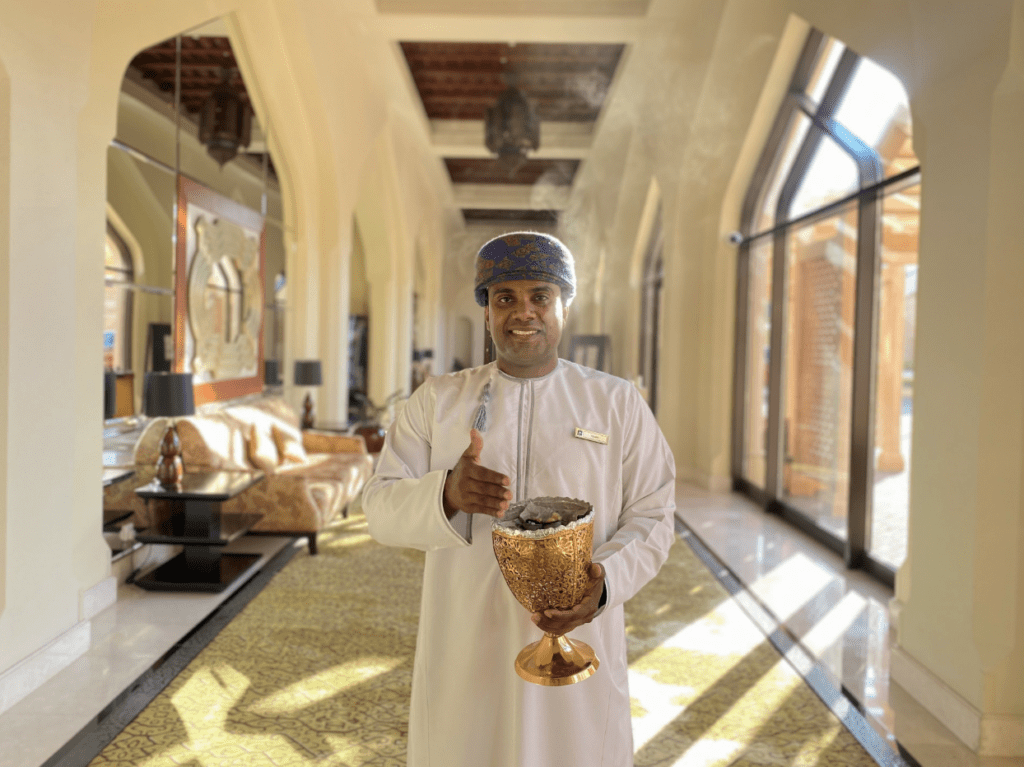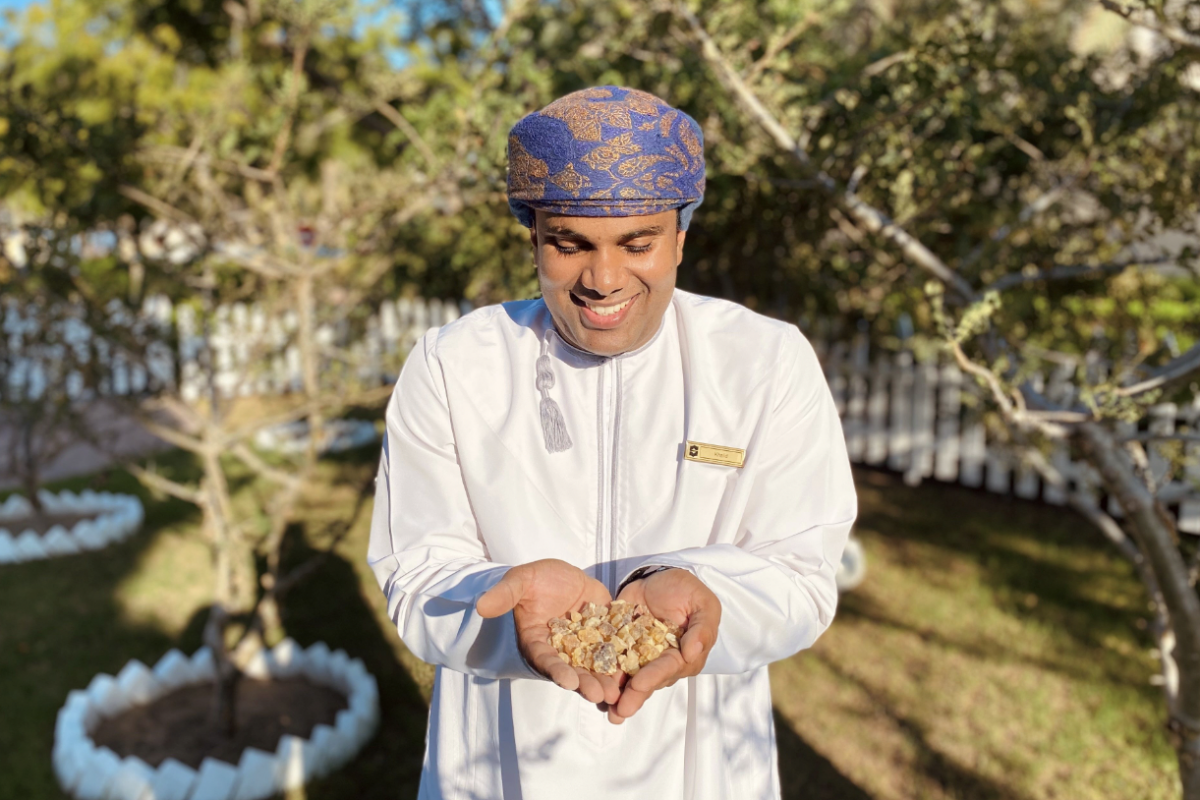Skift Take
As hotels seek to broaden their cultural offerings to guests, the Shangri-La Al Husn in Oman offers a masterclass. Through a specially trained cultural ambassador, the hotel brokers connections with art, architecture, and notably frankincense, an essential ingredient in the daily lives of Omanis.
 Every month Skift will profile someone working in the quirkiest, most incredible and surprising jobs in global travel. Skift's relentless curiosity about our industries extends to every corner of the labor market. Who knew jobs like this even existed?
Every month Skift will profile someone working in the quirkiest, most incredible and surprising jobs in global travel. Skift's relentless curiosity about our industries extends to every corner of the labor market. Who knew jobs like this even existed?
Many have a passing familiarity with frankincense given its role in the Bible and symbolic role in religion. In Oman, where some of the world’s best frankincense is produced, it is pervasive in all areas of society: from health and wellness, to hospitality and hosting, where the aromatic fragrance is burned to create a welcoming ambience. It is even burned during a woman’s pregnancy and after birth to protect the newborn and create a purified atmosphere.
It is something that spans nearly all of Omani culture, and by learning about it, by proxy you learn about many other things, from trade, to medicine, and also agriculture, climate, and ecology.
And it is the perfect vessel to examine soul, culture, and depth in Omani hospitality.
The Shangri-La Al Husn in Muscat, Oman, has named a Culture and Heritage Ambassador, Khalid Al Amri, to help guests understand Omani arts, architecture, and importantly, frankincense. He’s the first accredited frankincense sommelier in Oman, and the investment in training the hotel (and Khalid, as a student) undertook was significant: He trained for two years, under the guidance of Dr. Patricia Groves who has spent over 20 years researching and writing books about Oman’s heritage, arts and culture. His training took him from the frankincense trees in the Dhofar region of Oman, where some of the best product comes from, to the National Museum of Oman and Bait Al Zubair Museum, learning history and importantly, learning to weave this history into engaging narratives with dexterity and warmth.

Khalid recounts the rigor of his training process: “I thought as an Omani I knew everything there was to know,” he jokes. His induction into deeper realms of Omani culture was difficult: he wasn’t just supposed to have rote memorization of facts and topics, but rather to teach them back to Dr. Groves, making the story his own. This required a new level of dexterity in English, as well as living the story, rather than just recounting it. “My first presentation to her was tough, I didn’t have structure. But day after day, with reading and studying, I improved.” The Shangri-La staff recount to me how objectively difficult Khalid’s path was, with a hand built curriculum and demanding subject matter experts. Stephanie Rachid, director of development, was a key supporter and enabler of the process from the hotel, as well as Fahad Al Hasni, the curator of the Bait Al Zubair museum.
“It was important important to not become a robot that is reciting notes: my teachers told me they wanted to see my flavor in the recipe,” said Khalid. Topics ranged from the nuances of Omani architecture, to history, and art. And as he pushed through the training, Khalid had moments of doubt, but also breakthroughs. And as he recounts his journey, the storytelling, comes alive with dexterity and language, and a warmth as he goes into detail on the terroir and climatic conditions that make a certain frankincense special.

Khalid shares the history of the object: “in the pre-petroleum Arab world, this was a prestigious, elevated gift.” It was used as a commodity for trading by Omani seafaring merchants. “It is pre-luxury,” he laughs, alluding to the perceived glitz of areas in the current Middle East.
Frankincense is harvested from the plant tissue of trees: the sap hardens and becomes a resin that can be burned. In the country, Khalid says it is medicinal: Omani homes will have a small bottle of water with frankincense to cure a sore throat or opening the respiratory system to aid in breathing. “Not unlike Vicks,” he jokes.
The finest variety comes from Wadi Hojar, and Khalid tells me it is purest based on “the location of the trees, the terroir and limestone…The mountains block humidity and dust wind from reaching the area.” He tells me that the light, limestone rocks and the environment of the wadi suits the trees to protect the plant. When it is harvested, Khalid says it is by making cuts in the bark of the tree: the sap comes out to protect the tree from getting dust in it. It hardens for two weeks, and then is extracted and further produced.
Oman, and the broader Middle East are known for hosting and generous hospitality. The frankincense plays a role in how guests are welcomed into the hotel Al Husn. Khalid says it is also how they welcome guests at home, and the smoke is ever pervasive: from the logo of national airline Oman Air, to when it is infused into a piece of clothing or the body, to a women’s scarf or the hair. Even the traders who came from Africa on their Dhow (a ship used in the Indian Ocean), had large incense burner on the deck.
Khalid’s role is to be a cultural ambassador for guests, and help them understand the nuances of broader Omani culture. But the frankincense and culture are so deeply intertwined it made sense for him to further his education in the topic. And Khalid tells me that the pains and rigors of the process were worth it: “when I start living the story, it becomes more beautiful.”
Khalid is ever present in the arrivals and daily rhythms of the hotel, quick to pour a cup of Arabic coffee and engage guests as they explore the property. And wafts of the finest frankincense permeate the lobby, relaxing guests and creating an ambience that makes Omani culture more vivid and front-and-center to the senses when experienced. It also has a deeply calming effect, which is reflected in the gentleness and slower pace of the culture. When experiencing the frankincense, a Saudi guest quipped to Khalid, “Now we know why the Omani people are so calm and so relaxed.”
Have a confidential tip for Skift? Get in touch
Tags: at your service, hospitality, hotels, oman
Photo credit: Culture and Heritage Ambassador Khalid Al Amri teaches all aspects of frankincense at Shangri-La Al Husn in Muscat Oman. Shangri-La Al Husn in Muscat Oman
